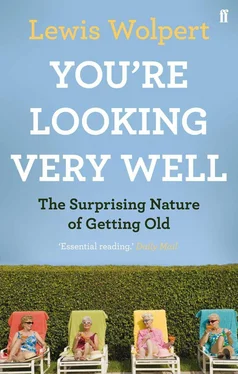Symptoms such as frailty, wandering, agitation, falls, and lack of motivation and appetite, create a huge burden for both patient and carers. A businessman, Gerry Robinson, used two BBC TV programmes to explore care homes for old patients with dementia. The results were distressing. Inmates can spend hours without any contact with anyone. A woman cried out for help for half an hour before anyone came; in another case an alarm cord was out of reach. Staff morale was very low. Robinson argued that engagement was essential for the inmates and the system needed to be reorganised. Person-centred care is essential, care which is tailored to meet the needs of the individual rather than those of the group or the staff.
Dementia sufferers are being ‘drugged and robbed’ by a system where they have to pay five times their pension for poor-quality care, according to the Alzheimer’s Society. More than 100,000 sufferers are being given the wrong drugs, which actually makes their condition worse, at a cost of over £ 60 million a year. Only about one fifth of nurses working with people with dementia receive any or enough dementia training, and almost all nurses said they found working with people with dementia very or quite challenging. A typical negative story describes staff leaving a sign next to the bed of a patient with dementia telling her: ‘You are not well, you need to stay in hospital. Just sit there, rest, relax and don’t bang the table.’ She did not understand and could not remember anything for longer than a few seconds. Dementia patients occupy a quarter of all hospital beds and are staying far longer in hospital than may be necessary. Not only does this cost the NHS hundreds of millions of pounds, but the majority of people with dementia leave hospital worse than when they arrive, and a third enter a care home, unable to return home.
The family of an Alzheimer’s sufferer have won a legal battle to reclaim more than £ 100,000 in care-home fees that the local NHS trust had refused to pay because it claimed that her condition was not health-related. Health authorities had ruled that the patient, who died aged 74, did not qualify for NHS funding because her condition was deemed to be a social, rather than a health, problem. As a result, she was forced to sell the home that she had lived in for 30 years for £ 170,000 to pay for her £ 600-a-week nursing home fees.
The practice of over-prescribing medication is based on the assumption that it is the natural process of ageing for the quality of health to decrease, and therefore there is no point in attempting to prevent the inevitable decline of old age. Such differential medical treatment of elderly people can have significant effects on their health outcomes. However, free influenza immunisation is being offered to everyone aged 65 and over, and routine breast cancer screening is being extended to women up to and including the age of 70.
A study in Newcastle of 85-year-olds gave a positive set of results for medical care by the NHS. Almost one third of the sample had attended outpatient clinics in the three months before the study. In the previous year, 20 per cent had had at least one overnight stay in hospital, spending, on average, seven days in total over the stays. Almost all of the sample had seen their general practitioner within the past year. Perhaps the most striking findings were the low levels of disability of people living in institutional care, and positive self-rated health despite high levels of disease and impairment. Although women were more likely to survive to age 85, they were more likely to be living in institutional care, to have a higher total disease count and higher prevalence of many diseases.
A three-month undercover investigation at Brighton’s Royal Sussex County Hospital by the BBC’s Panorama showed how hospital care can fail the elderly. In one scene a patient is left to die on her own; another patient is left waiting hours to go to the toilet; another was left screaming with pain as she had not been give her medication for hours. Margaret Haywood, a nurse with more than 20 years’ experience, agreed to go undercover for the Panorama programme, wearing a hidden camera while working as a nurse to fill a short-staffed ward at the hospital for 28 shifts on an acute medical ward. She found that none of the patients had a care plan. She was then struck off from working as a nurse, but this was later reduced to a one-year caution.
An environmental factor, cold, has been responsible for the deaths of many old people in their homes. The average energy bill has increased by 80 per cent since January 2003‚ and an energy bill of £ 1‚027 would absorb 16 per cent of the income of a single pensioner. In the winter of 2004/5‚ more than 30,000 people over 65 died from cold-related illnesses in England and Wales, and there were some 16,000 excess winter deaths among the over-75s. Because nearly half of pensioners will cut heating in winter for financial reasons, some 5 million over 60 will get cold shock. The UK has a higher number of winter deaths than in colder European countries, despite the government’s winter fuel payments.
It is very unusual for the cold to kill people directly, and in the main these deaths are from respiratory or cardiovascular ailments. Deaths may also result from heart attacks‚ strokes‚ and bronchial and other conditions‚ and may often occur several days after exposure to the cold. The elderly are more vulnerable because of various illnesses and of course, the failure to warm their homes. Age Concern estimated that 250‚000 older households have been pushed into fuel poverty by price hikes. Many pensioners have to choose between eating or heating.
Paul Cann‚ from the new united charity Age UK, says:
To deliver consistent and decent quality healthcare for older people‚ dignity must be at the heart of the NHS Reform Bill. On every occasion and in every health setting‚ older people should be alleviated from discomfort and pain‚ given help to make choices and treated as individuals not numbers.
‘The tragedy of old age is not that one is old, but that one is young’
— Oscar Wilde
Men and women in the developed world typically live longer now than they did throughout history, an increase from about 25 years 2,000 years ago to around 80 at the beginning of the twenty-first century. The increase has been mainly due to the advances in medicine and biology which have given us vaccines and antibiotics, and the development of sanitation systems, as well as better lifestyles and better nutrition. All of these have been successful in preventing infectious and parasitic diseases causing premature deaths. But we now need to understand the implications of the increase in age of the population.
At present just 11 per cent of the world’s population are over 60, but in developed countries they will be one third of the population by 2050. In rich countries one in three individuals will be pensioners and one in 10 over 80. In some countries in the West the over 65s are the fastest growing age group. Those over 80 in the world are expected to increase to 4 per cent by 2050, four times more than now. Current estimates are that 700,000 of those in the UK at present around 25 years old will live to be a hundred. Moreover, half of babies being born now will reach a hundred thanks to higher living standards. But our bodies are still wearing out. Children will be outnumbered by those over 75 in what some call the Zimmer-frame society. How will society adapt?
A majority view is that an increase in numbers of older people would make no difference to safety, security, standards of living, health or access to jobs and education. But one third of the public think life would be worsened by an increase in the older population because it would have negative economic effects. It is worth noting that by 2050 it is estimated that more than one third of voters in the UK will be over 65, and since the old vote more than the young, they could wield much power and vote for much costly support in their old age.
Читать дальше












